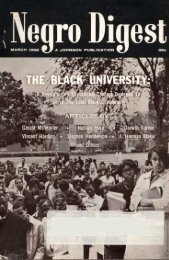3. Strain, Christopher Barry. “Civil Rights and ... - Freedom Archives
3. Strain, Christopher Barry. “Civil Rights and ... - Freedom Archives
3. Strain, Christopher Barry. “Civil Rights and ... - Freedom Archives
Create successful ePaper yourself
Turn your PDF publications into a flip-book with our unique Google optimized e-Paper software.
foae if necessary. Malcolm X noted that "Robert Williams became an exile from this<br />
country simply because he was trying to get out people to defend themselves against the<br />
Ku Klux Klan <strong>and</strong> other white supremacist elements:' On another occasion, he called<br />
Williams "a very good friend of mine" (though the two never met) who was "just a<br />
couple of years ahead of his time" ; Williams, Malcolm X attested, "laid a good<br />
groundwork;' <strong>and</strong> "will be given credit in history for the st<strong>and</strong> that he took<br />
prematurely." es Huey Newton reported that "Ne¢roes With Guns . . . had a great<br />
influence on the kind of party we developed ."~ And Eldridge Cleaver confirmed<br />
Williams's impact on the Black Panthers . "Robert Williams <strong>and</strong> Malcolm X st<strong>and</strong> as two<br />
titans, even prophetic figures who heralded the coming of the gun, the day of the gun, <strong>and</strong><br />
the resort to armed struggle by Afro-America . . . Williams has made just as much impact<br />
as Malcolm ." a~<br />
Malcolm X, interviewed by A . B . Spellman, March 19, 1964, New York,<br />
reproduced in Malcolm X, By Any Means Necessary Speeches. :<br />
Interviews. <strong>and</strong> a Letter<br />
by Malcolm X (New York : Pathfinder, 1970), 11 .<br />
ssMalcolm X, interviewed by Joe Rainey, March 8, 1964, WDAS Radio, Philadelphia,<br />
transcript, reprinted in David Gallen, ed., Malcolm X : As They Knew Him (New York:<br />
Carroll & Graf, 1992), 164 .<br />
~EIuey<br />
^<br />
icidc Newton, Revolutionary Su (New York: Harcourt Brace Javonovich,<br />
1973), 112 .<br />
s~Eldridge Cleaver, "The L<strong>and</strong> Question <strong>and</strong> Black Liberation ;' Post-Prison Writings<br />
<strong>and</strong>S~ (New York: Vintage Books, 1967), 71 . According to William McCord,<br />
Williams "had some roots in the black community" (unlike earlier blacks associated with<br />
the radical left) <strong>and</strong> "did not deal solely in esoteric ideology." He evolved "a set of<br />
strategies <strong>and</strong> tactics intended for the here <strong>and</strong> now :' For these reasons, his immediacy<br />
appealed to the revolutionary outlook of the Panthers . McCord et. al ., Life Styles in the<br />
Black Ghetto, 240, 242 .<br />
68
















